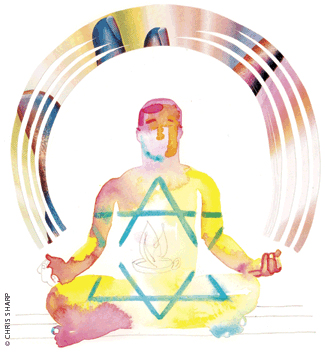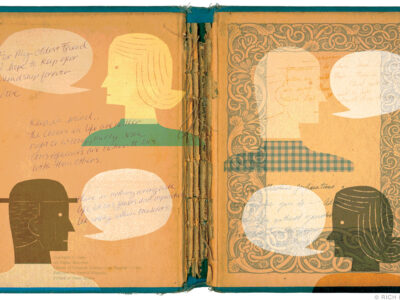
A literary rabbi meditates on life, consciousness, emptiness, and leave-taking.
The personal odyssey of Alan Lew C’65 began with the “consciousness-altering” experience of reading James Joyce’s Ulysses during his senior year at Penn. It led him, indirectly, to Buddhism, and ultimately back to his Jewish roots. It also led him to writing. His books include One God Clapping: The Spiritual Path of a Zen Rabbi; This is Real and You Are Completely Unprepared; and the just-published Be Still and Get Going: A Jewish Meditation Practice for Real Life.
Lew retired earlier this year, after 14 years as rabbi of San Francisco’s Congregation Beth Sholom, one of California’s largest Conservative congregations. He’s credited with making the congregation a progressive force in the movement and with co-founding, with his friend Norman Fischer, the groundbreaking Jewish meditation center Makor Or. In a wide-ranging interview in the San Francisco home he shares with his wife, the novelist Sherril Jaffe, Rabbi Lew talked with Robert E. Shepard C’83 G’83 about the trajectory of his life from the New York suburbs to Penn, the Iowa Writers Workshop, and California—and from an agnostic childhood to Buddhism and then back to his Jewish roots.
In your first book, One God Clapping: The Spiritual Path of a Zen Rabbi, you wrote about your sense, in childhood, that there was a spiritual dimension to reality. Would you say most children have this sense? Is it something we lose later?
The self gets in the way. The wholeness of life breaks down in adolescence; that’s why spiritual practice becomes so important in adulthood. My original Zen master, who was Japanese, focused once on a single line of Gospel: “Unless you be as little children, you will never enter the kingdom of heaven.”
You also wrote of two experiences at Penn that were transformative: reading Joyce and listening to Beethoven. How did these reshape the way you looked at God and our place in creation?
In as resolutely secular a culture as that was, the repository of spirituality was art. That’s where it was kept; that’s where it was hidden away. Joyce was a very powerful influence during my Penn years. In a senior seminar, I remember writing a paper on the Penelope chapter, the last chapter of Ulysses, still the high point of all human literature. It was a consciousness-altering experience, and it did something to me that was just like what Zen study would do later on. You crash through linear consciousness. Hurling myself up against the wall of that prose-flow that really came from another part of the mind carried me beyond my usual consciousness and into a different way of being with the world.
[As for Beethoven,] my mother was a concert pianist, so I’d grown up with music, and I loved this class above all others. One night in class … we listened to Beethoven’s Ninth Symphony, and as the last movement was playing I felt myself awash in stars; it was as if I was flying through the stars and bathing in them at the same time. And then the professor read the text, and Schiller’s poem talks about the stars. Many years later, I happened to read Beethoven’s journal and was amazed to find that he’d also compared this passage to bathing in stars.
I didn’t think of this as transformative at the time, or the beginning of something. But both of these experiences, especially the Beethoven “incident,” felt important. They were two experiences that led me to focus on spirituality later, when I left the Iowa Writers Workshop. Of course it’s a little disingenuous to talk about Penn solely in terms of Joyce. I was a member of Sammy [Sigma Alpha Mu]; I also loved Rowbottoms. For the first two years, especially, I was kind of a standard-issue Penn guy. Then I began to grow into who I was.
In your new book, you focus on what you call “leave-takings”—moments that are among the most powerful in our lives—and about how meditation can help us prepare for these. How does it do this, and can it also help us deal with more mundane moments?
The Hebrew term for meditation, hit bod’dedut, means “leave-taking.” It comes from the root, bod, which means “to be alone,” to “cause to be alone,” or “to leave.” Meditation helps you deal with the “500-ton” leave-takings in life, but this is almost incidental, because the purpose of meditation is to help you shed the sense of habit that stands between you and your experience. There’s a deep human need for comfort and security, and that makes us uncomfortable with being vulnerable … You’re constantly going against this instinct for comfort and security when you meditate.
Your parents wanted you to be a doctor or a lawyer; instead, you ended up a Buddhist, then a rabbi, poet, and author. Were they proud of you?
They were always supportive, but they did have a fairly clear idea of what they thought I should be. When I was at Penn, all hopes of being a doctor were dashed by my performance in biology and chemistry. Law school [at Georgetown] proved equally ridiculous. My most dramatic early leave-taking was leaving law school, because it really meant taking leave of their dreams. But they got used to the idea.
What can your fellow alumni learn from your career trajectory?
My dream when I was at Penn was to be a writer. Later, I went to the Iowa Writers Workshop. Now, I think of writing as my primary occupation. I’m working on a book I first conceived when I was at Penn … a long family history that begins in the mid-19th century and comes down to the mid-1960s.
What’s Jewish about the kind of meditation you teach?
When you really start looking at Jewish sources, you see this kind of practice affirmed on practically every page of sacred writings. In Mishnah, the early pious ones are said to have sat for an hour before prayer every day in order to direct their minds toward God. You have to spend some time orienting yourself toward this kind of effort.
You’ve written in all of your books, including This is Real and You Are Completely Unprepared, about the “emptiness at the center”—the idea that if we tear away all the trappings of our lives and search for what’s at the heart of our existence, we find an empty space, but one that can be filled with the presence of the divine.
A lot of the dysfunctions that are characteristic of our lives stem from trying to hold this intuition—that what’s at the center of our lives is emptiness—at bay. Everything is rising up and falling away at all times, and you have to live with that. But the Buddhists argue that although everything fades to emptiness at the end, emptiness is, itself, also a form. You find this all over the [Jewish] literature, as well, but especially in the description of the Temple, a formal structure built around an empty space—around nothing. The emptiness at the center of existence is YHVH [the Hebrew letters signifying God’s unpronounceable name]. The only way you can say “to be” in the present tense in Hebrew is by using the Hebrew name of God.
You emphasize that meditation can be a community or group practice, not something solitary. In what way do you see meditation and synagogue, or other organized worship, working hand-in-hand?
The old cliché about meditation is that it’s really just navel-worshipping. But when you meditate in a community of others, you begin to feel almost an identity with them. After a while you begin to feel that your thoughts are rising and falling with theirs. That connection really sustains you in your practice.
What do you say to those who say that this is all a little unconventional coming from a Conservative rabbi?
I say it’s strange and unconventional coming from a Conservative rabbi! But 10 years of Zen practice led me to Judaism precisely because it forced me to examine aspects of my life to which I hadn’t given attention. And finally that’s all I wanted to do: practice Judaism. I continued my private meditation, but I wasn’t immediately interested in making a grand synthesis. It was actually Rabbi Eliezer Diamond, one of my professors at the JTS [Jewish Theological Seminary], who encouraged me to write a book synthesizing the two traditions … It amazes me the degree of acceptance of meditation in the Conservative movement.
You recently retired as senior rabbi at Beth Sholom. When all is said and done, are you glad you were a pulpit rabbi?
I’m very glad I was. You meet people in the really deep places in their lives when you’re a congregational rabbi—the deaths, the births. You see people in a state of deep reality. Which is difficult sometimes, but I wouldn’t trade that for the world. It’s a sacred calling to try to bring sanctity to people’s lives.
You’re probably one of the only spiritual leaders ever to quote “Drink a Highball” in a sermon.
[Laughs] I’m sure that’s true, but “Drink a Highball” is a very profound statement on the impermanence of everything!
Robert E. Shepard C’83 G’83, a congregant at Congregation Beth Sholom, is a literary agent in Berkeley, California.




